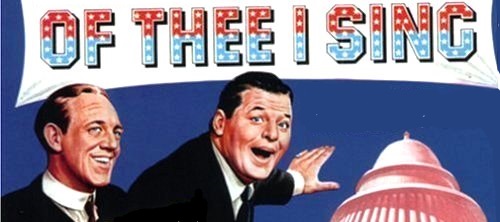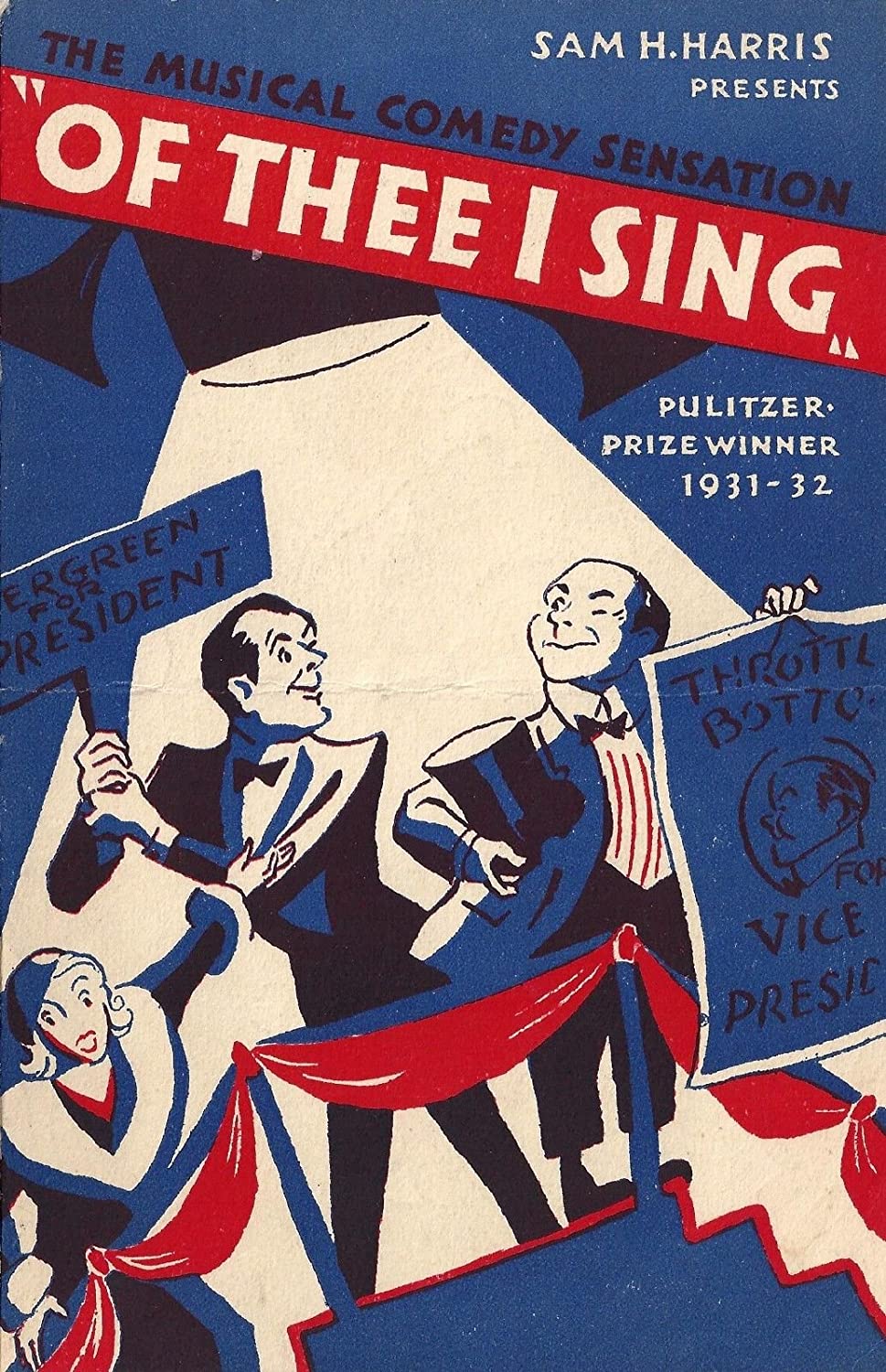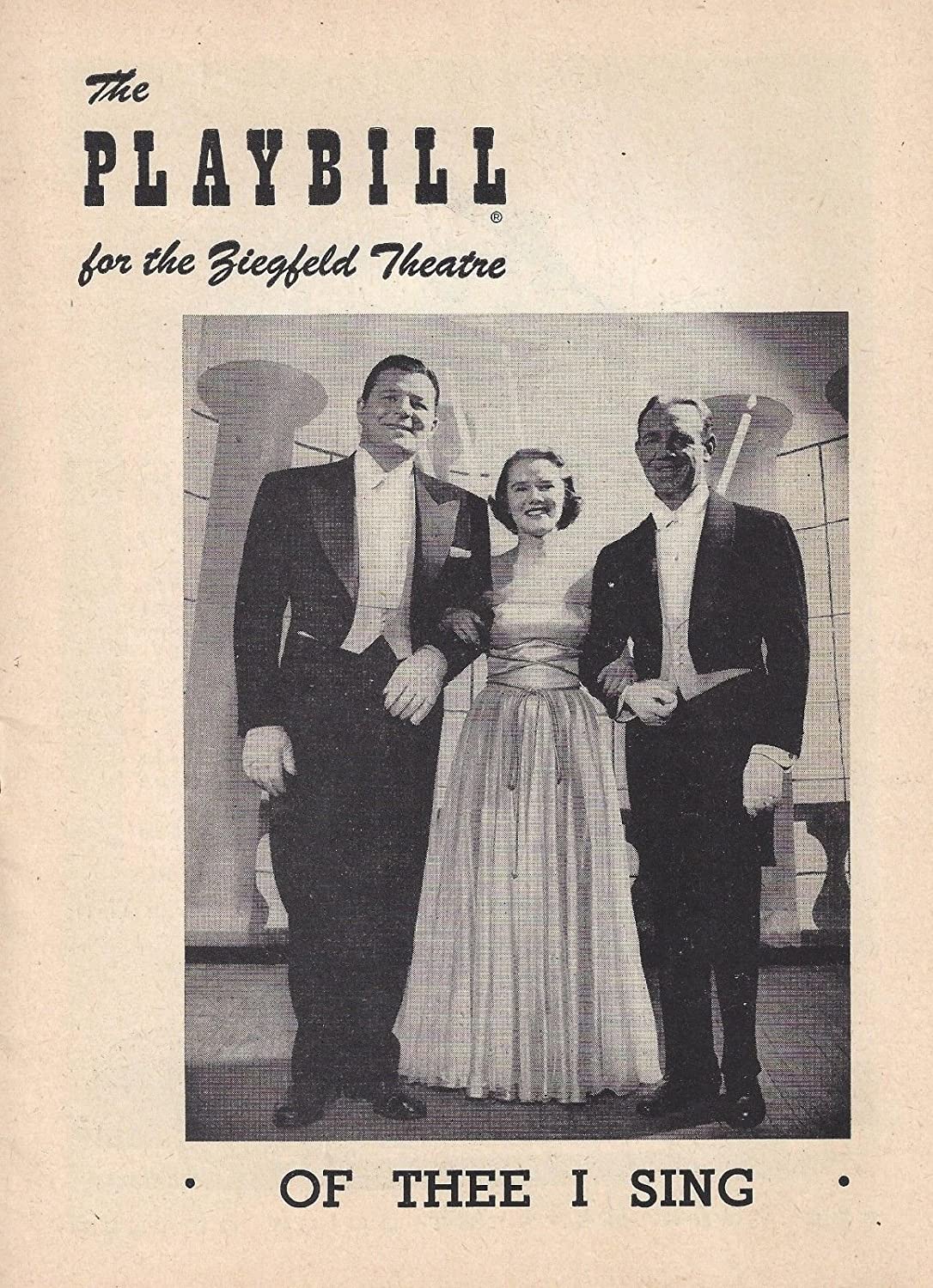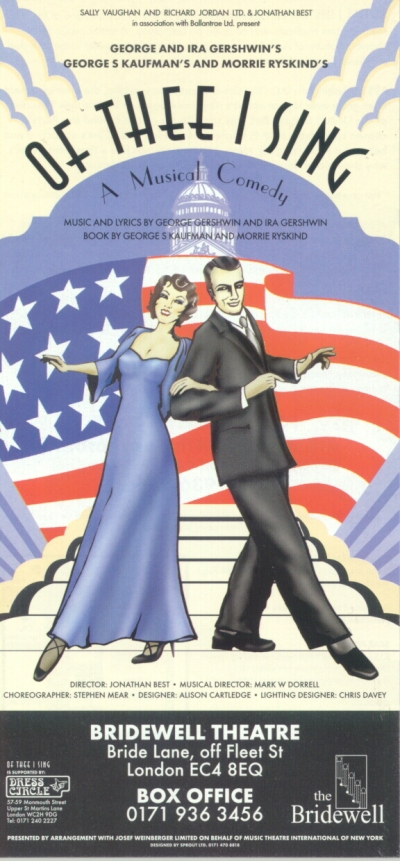Of thee I sing
Musical (1931)

Of Thee I Sing is a musical with a score by George Gershwin, lyrics by Ira Gershwin and a book by George S. Kaufman and Morrie Ryskind. The musical lampoons American politics; the story concerns John P. Wintergreen, who runs for President of the United States on the "love" platform. When he falls in love with the sensible Mary Turner instead of Diana Devereaux, the beautiful pageant winner selected for him, he gets into political hot water.
The original Broadway production, directed by Kaufman, opened in 1931 and ran for 441 performances, gaining critical and box office success. It has been revived twice on Broadway and in concert stagings in the U.S. and in London. In 1932, Of Thee I Sing was the first musical to win the Pulitzer Prize for Drama.
The Gershwins and George S. Kaufman had collaborated on a satirical musical in 1927 entitled Strike up the Band, which played in Philadelphia. The show concerned a cheese manufacturer who sponsors a war against Switzerland because it will be named after him. A version of Strike Up the Band, with the book altered by Morrie Ryskind, played on Broadway in early 1930. Much of the satire was replaced in the new version by silliness, leading Ryskind to recall, "What I had to do, in a sense, was to rewrite War and Peace for the Three Stooges."
Later that year, Kaufman and Ryskind conceived a new musical focusing on satire about rival political parties battling over a new national anthem. The Gershwin brothers agreed to write the score, although they were scheduled to be in Hollywood writing songs for the film Delicious. Kaufman and Ryskind soon realized that their concept did not provide sufficient plot for a musical. They crafted a libretto inspired by the timeless battle of political idealism with corruption and incompetency, creating the first American musical with a consistently satiric tone. The writers and the cast were unsure of what the public's reception would be, prompting Kaufman's now-famous statement, "Satire is what closes on Saturday night."
Productions
The original Broadway production, directed by Kaufman, opened at the Music Box Theatre on December 26, 1931 and ran for 441 performances. The cast included William Gaxton as John P. Wintergreen, Lois Moran as Mary Turner, Grace Brinkley as Diana Devereaux, Victor Moore as Alexander Throttlebottom and George Murphy as Sam Jenkins. It was produced by Sam H. Harris. Sets were designed by Jo Mielziner, costumes by Carles LeMaire, and dances staged by Georgie Hale. It was Gaxton and Moore's first comedic pairing; they would collaborate on six more Broadway musicals, including Anything Goes. The orchestrations were by Robert Russell Bennett, William Daly (including the "Overture"), and Gershwin ("Hello, Good Morning"). Of Thee I Sing was the longest-running Gershwin show during George Gershwin's lifetime.
There were Broadway revivals in 1933 at the Imperial Theatre and in 1952 at the Ziegfeld Theatre, both directed by Kaufman. A concert production of Of Thee I Sing was mounted by Ian Marshall Fisher's Lost Musicals series at the Barbican Centre in London in August 1996. Fisher's series examines the Gershwins' lesser known works (as well as others) and has been based at London's Royal Opera House and Sadler's Wells. The musical was presented in May 2006 as part of the New York City Center Encores! staged concert series. Directed by John Rando and choreographed by Randy Skinner, the cast starred Victor Garber as John P. Wintergreen, Jefferson Mays as Vice President, Alexander Throttlebottom, and Jennifer Laura Thompson as First Lady.
The latest revival was in July 2015 at the Royal Festival Hall, London by producer Ollie Rosenblatt as a full musical with orchestra. Diana Devereaux was played by Hannah Waddingham, Wintergreen by Hadley Fraser and Throttlebottom by Tom Edden. The Royal Philharmonic Concert Orchestra provided the new musical setting for the piece. In September 2015 the Sqabbalogic theatre company and Sydney Philharmonia Choirs presented the musical in the Concert Hall, Sydney Opera House.
Acte I
In the U.S. in the 1930s, a campaign parade is taking place to support Wintergreen for President. John P. Wintergreen has been nominated for President and Alexander Throttlebottom has been nominated for Vice President, but he is of such little importance no one can remember who he is. Politicians meet in a hotel room to devise a campaign platform, and when they ask the chambermaid what she cares about, she first says "money," then "love" when pressed further. The men decide that Wintergreen's platform will be "love;" they'll have a pageant to select the most beautiful girl in the United States, and Wintergreen will fall in love and marry her.The pageant begins in Atlantic City, New Jersey, and the contestants wonder, Who is the Lucky Girl to Be? The photographers assure them that even if they do not win, they will surely be loved (The Dimple on My Knee). Wintergreen is getting nervous about marrying a girl he doesn't know. While the girls are at the final judging, he confides in Mary Turner, the sensible young woman running the pageant. He does not want to marry a girl just because she's beautiful; he wants a wife who will make a good home for him and his future children. Mary shares her corn muffin with him. Wintergreen tells Mary that he'd rather marry her than any of the girls in the contest. He kisses her, and she agrees to marry him. The judges of the pageant announce that Diana Devereaux, a beautiful southern girl, has won the contest, but Wintergreen declares that he loves Mary Turner. When he gives some of Mary's extraordinary corn muffins to the judges, they agree that John and Mary are meant to wed (Because, Because).
Outside Madison Square Garden in New York City, at a rally for Wintergreen, the campaigners declare that Love is Sweeping the Country. Inside, where politicians are speaking in favor of Wintergreen, a wrestling match is going on just below the speakers' platform as Alexander Throttlebottom tries to explain to the organizers that he's the candidate for Vice-President. Wintergreen proposes to Mary onstage, as he has in forty-seven states before. She accepts again, and Wintergreen sings the campaign song to her, Of Thee I Sing.
On election night, Wintergreen wins by a landslide. Inauguration day arrives, which is also Wintergreen's wedding day. As his inaugural address, Wintergreen bids goodbye to the girls he used to know (Here's a Kiss for Cinderella). The Chief Justice presides over the wedding ceremony, and just after he has pronounced John and Mary man and wife, Diana Devereaux interrupts the proceedings. She is serving Wintergreen with a summons for breach of promise. She insists she is the one he should have married (I Was the Most Beautiful Blossom). The Supreme Court rules that Mary's corn muffins are more important than justice in this matter, and Diana angrily leaves to tell her story across the nation. Wintergreen leads the Supreme Court and spectators in a chorus of Of Thee I Sing.
Acte II
John and Mary settle down to business in the White House. Her "desk," back-to-back with his, is a fully loaded tea-table. Their secretaries greet each other "Hello, Good Morning." Alexander Throttlebottom, now Vice-President, sneaks into the White House with a tour group. When a guide tells him that the Vice-President's job is to preside over the U. S. Senate, Throttlebottom eagerly dashes off to the Capitol. Wintergreen's fellow party members inform him that Diana Devereaux is gaining support across the nation. Wintergreen holds a press conference and tells the reporters that his love for Mary is the only thing that matters (Who Cares?). The French ambassador unexpectedly arrives (Garçon, S'il Vous Plaît). He has a surprise for Mr. Wintergreen: Diana is "'The Illegitimate Daughter' of the illegitimate son of the illegitimate nephew of Napoleon." He insists that Wintergreen annul his marriage and marry Diana to right his grievous offense against France. Everyone agrees that Wintergreen should be impeached for breach of promise (We'll Impeach Him), but John and Mary do not care, since they have each other (Who Cares?" (Reprise)).Throttlebottom has found the Senate, and the party members inform him that he will soon be President. He is very excited and goes into the Senate Chamber to preside, beginning by taking "The Roll Call." The resolution on the impeachment of the President is brought up, and the French Ambassador and Diana mournfully insist that she was Jilted. Mary saves the day when she announces that she is pregnant (Who Could Ask For Anything More?). The senators refuse to impeach an expectant father, and Wintergreen declares that Posterity is just around the corner. The French Ambassador informs Wintergreen that by not marrying Diana, he has contributed to France's declining birth rate. He demands the Wintergreens' baby as a replacement for the one they have "taken" from France. John refuses, and the ambassador walks out.
In the Yellow Room of the White House, guests are arriving bearing gifts for the baby (Trumpeter, Blow Your Horn). Wintergreen is nervously awaiting the baby's birth when the French Ambassador arrives with a final message from France: surrender the baby or France will sever diplomatic relations with the U.S. The Supreme Court justices, who have the duty to determine the sex of the baby, announce that twins have been born, a boy and a girl. The French ambassador is even more wounded by this proclamation: France has lost two babies instead of one! Diana mournfully joins him, and Alexander Throttlebottom arrives bearing sweaters for the babies. The French Ambassador is about to declare war when Wintergreen has a brilliant idea: according to Article Twelve of the Constitution, when the President of the United States is unable to fulfill his duties, his obligations are assumed by the Vice-President! The ambassador calls Wintergreen a genius, and Throttlebottom is ecstatic as they pass Diana over to him. Servants wheel a large bed into the room, where Mary sits with the babies. Wintergreen leads everyone in proclaiming, "Of Thee I Sing."
Musical and dramatic analysis
Of Thee I Sing was the most musically sophisticated of the Gershwin shows up to then, inspired by the works of Gilbert and Sullivan[3] and boasting a varied score including extensive recitative, choral commentary, marches, pastiches, elaborate contrapuntal passages, and ballads. Most songs were lengthy and included a large ensemble. In addition, as an integrated song-and-story production it produced fewer hit songs than many of the Gershwins' musicals. Ira Gershwin explained, "In the show there are no verse-and-chorus songs; there is a sort of recitative running along, and lots of finales and finalettos. Ira Gershwin recalled that the title song, inspired by the final phrase of "My Country, 'Tis of Thee", was somewhat controversial among the production staff. "When we first played this sentimental political campaign song... there were objectors who thought that juxtaposing the dignified 'of thee I sing' with a slangy 'baby' was going a bit too far. Our response was that, naturally, we'd replace it with something else if the paying audience didn't take to it. Opening night, and even weeks later, one could hear a continuous 'Of thee I sing, baby!' in the lobby at intermission time." The music was "employed throughout in what was unquestionably the most closely integrated manner of any Broadway show to that time...Almost everything ...was created with a skill that had rarely been equaled in the musical comedy theatre."
Of Thee I Sing was the first American musical with a consistently satirical tone. Congress, the U.S. Supreme Court, the Presidency, and the democratic process itself were all targets of this satire, prompting original stars William Gaxton and Victor Moore to wonder if they would face government repercussions for their portrayals of President Wintergreen and Vice President Throttlebottom. Specific political parties are not identified in the musical, as Kaufman and Ryskind believed that absurdity was bipartisan in Depression-era politics.
Acte I
Wintergreen for President* – EnsembleWho is the Lucky Girl to Be? – Diana Devereaux and Ensemble
The Dimple on My Knee – Diana, Sam Jenkins and Ensemble
Because, Because – Diana, Sam and Ensemble
As the Chairman of the Committee – Matthew Arnold Fulton and Company
How Beautiful – Company
Never Was There a Girl So Fair – Company
Some Girls Can Bake a Pie – John P. Wintergreen, Mary Turner and Company
Love is Sweeping the Country – Sam, Emily Benson and Ensemble
Of Thee I Sing – Wintergreen, Mary and Company
Here's a Kiss for Cinderella – Wintergreen and Ensemble
I Was the Most Beautiful Blossom – Diana
Some Girls Can Bake a Pie (Reprise) – Wintergreen, Diana, Judges and Ensemble
Acte II
Hello, Good Morning – Sam, Emily and SecretariesWho Cares? – Wintergreen, Mary and Reporters
Garçon, S'il Vous Plaît** – French Soldiers
The Illegitimate Daughter – The French Ambassador and Ensemble
We'll Impeach Him – Senator Robert E. Lyons, Francis X. Gilhooley and Ensemble
Who Cares? (Reprise) – Wintergreen and Mary
The (Senatorial) Roll Call – Alexander Throttlebottom and Ensemble
Jilted – Diana and Company
Who Could Ask for Anything More? – Mary and Company
Posterity – Wintergreen and Company
Trumpeter, Blow Your Horn – Ensemble
Finale – Company
*The campaign song "Wintergreen for President" includes parts of folk and patriotic songs such as Sousa's "Stars and Stripes Forever", and "Hail, Hail, the Gang's All Here." The song has been adopted by the Harvard University Band as a pep song, and is traditionally played at Harvard football games.
**The music introducing the French and their ambassador includes the opening bars of Gershwin's own "An American in Paris".
Aucun dossier informatif complémentaire concernant Of thee I sing
Aucun dossier informatif complémentaire concernant Of thee I sing

Version 1
Of thee I sing (1931-12-Music Box Theatre-Broadway)
Type de série: OriginalThéâtre: Music Box Theatre (Broadway - Etats-Unis) Durée : 1 an 2 semaines Nombre : 441 représentationsPremière Preview : 26 December 1931
Première: 26 December 1931
Dernière: 14 January 1933Mise en scène : George S. Kaufman • Chorégraphie : Producteur : Star(s) : Avec: Ruth Adams (Ensemble), Dave Allman (The Jack Linton Band), Florenz Ames (The French Ambassador), Kathleen Ayres (Ensemble), Bruce BarclayVivian Barry (Chambermaid), Charles Bennett (The Jack Linton Band), Leslie Bingham (Nora), Grace Brinkley (Diana Devereaux), Bobbie Brodsley (Ensemble), Robert Burton (Ensemble), Martha Carroll (Ensemble), Mary Carroll (Ensemble), Ray Clarke (Ensemble), Dudley Clements (Matthew Arnold Fulton), Charles Conklin (Ensemble), Tom Curley (Ensemble), Dorothy Donnelly (Ensemble), Tom Draak (Vladimir Vidovitch), Leon Dunar (Ensemble), Ann Ecklund (Ensemble), Frank Erickson (Ensemble), Jack Fago (Ensemble), Michael Forbes (Ensemble), Olgene Foster (Ensemble), Virginia Franck (Ensemble), Frank Gagen (Ensemble), William Gaxton (John P. Wintergreen), Dorothy Graves (Ensemble), Yvonne Gray (Ensemble), Peggy Greene (Ensemble), Sulo Hevonpaa (Yusef Yussevitch), Walter Hinger (The Jack Linton Band), Milton Hollander (The Jack Linton Band), Georgette Lampsi (Ensemble), Terry Lawlor (Ensemble), David Lawrence (Ensemble), Martin Le Roy (Chief Senate Clerk), Jack Linton (The Jack Linton Band), Lillian Lorray (Ensemble), George E. Mack (Senator Robert E. Lyons), Martha Maggard (Ensemble), Sam Mann (Louis Lippman), Mary Mascher (Ensemble), John McCahill (Ensemble), Charles McClelland (Ensemble), Jake Vander Meulen (The Jack Linton Band), Frank Miller (The Jack Linton Band), Harold Moffet (Francis X. Gilhooley), Victor Moore (Alexander Throttlebottom), Lois Moran (Mary Turner), George Murphy (Sam Jenkins), Richard Neely (Ensemble), Hazzard Newberry (Ensemble), June O'Dea (Emily Benson), Anita Pam (Ensemble), Jack Ray (Ensemble), Ralph Riggs (The Chief Justice), Edward H. Robins (Senator Carver Jones), Billie Seward (Ensemble), Pete Shance (The Jack Linton Band), Grenna Sloane (Ensemble), Adele Smith (Ensemble), Barbara Smith (Ensemble), Baun Sturtz (Ensemble), Peggy Thomas (Ensemble), Patricia Whitney (Ensemble), Jessica Worth (Ensemble)Commentaires : Music Box Theatre (Dec 26, 1931 - Oct 1933)
46th Street Theatre (Oct 10, 1932 - Jan 14, 1933)

Version 2
Of thee I sing (1933-05-Imperial Theatre-Broadway)
Type de série: RepriseThéâtre: Imperial Theatre (Broadway - Etats-Unis) Durée : 3 semaines Nombre : 32 représentationsPremière Preview : 15 May 1933
Première: 15 May 1933
Dernière: 10 June 1933Mise en scène : George S. Kaufman • Chorégraphie : Producteur : Star(s) : Avec: Ruth Adams (Ensemble), Dave Allman (The Jack Linton Band), Florenz Ames (The French Ambassador), Kathleen Ayres (Ensemble), Bruce BarclayVivian Barry (Chambermaid), Charles Bennett (The Jack Linton Band), Leslie Bingham (Nora), Grace Brinkley (Diana Devereaux), Bobbie Brodsley (Ensemble), Robert Burton (Ensemble), Martha Carroll (Ensemble), Mary Carroll (Ensemble), Ray Clarke (Ensemble), Dudley Clements (Matthew Arnold Fulton), Charles Conklin (Ensemble), Tom Curley (Ensemble), Dorothy Donnelly (Ensemble), Tom Draak (Vladimir Vidovitch), Leon Dunar (Ensemble), Ann Ecklund (Ensemble), Frank Erickson (Ensemble), Jack Fago (Ensemble), Michael Forbes (Ensemble), Olgene Foster (Ensemble), Virginia Franck (Ensemble), Frank Gagen (Ensemble), William Gaxton (John P. Wintergreen), Dorothy Graves (Ensemble), Yvonne Gray (Ensemble), Peggy Greene (Ensemble), Sulo Hevonpaa (Yusef Yussevitch), Walter Hinger (The Jack Linton Band), Milton Hollander (The Jack Linton Band), Georgette Lampsi (Ensemble), Terry Lawlor (Ensemble), David Lawrence (Ensemble), Martin Le Roy (Chief Senate Clerk), Jack Linton (The Jack Linton Band), Lillian Lorray (Ensemble), George E. Mack (Senator Robert E. Lyons), Martha Maggard (Ensemble), Sam Mann (Louis Lippman), Mary Mascher (Ensemble), John McCahill (Ensemble), Charles McClelland (Ensemble), Jake Vander Meulen (The Jack Linton Band), Frank Miller (The Jack Linton Band), Harold Moffet (Francis X. Gilhooley), Victor Moore (Alexander Throttlebottom), Lois Moran (Mary Turner), George Murphy (Sam Jenkins), Richard Neely (Ensemble), Hazzard Newberry (Ensemble), June O'Dea (Emily Benson), Anita Pam (Ensemble), Jack Ray (Ensemble), Ralph Riggs (The Chief Justice), Edward H. Robins (Senator Carver Jones), Billie Seward (Ensemble), Pete Shance (The Jack Linton Band), Grenna Sloane (Ensemble), Adele Smith (Ensemble), Barbara Smith (Ensemble), Baun Sturtz (Ensemble), Peggy Thomas (Ensemble), Patricia Whitney (Ensemble), Jessica Worth (Ensemble)

Version 3
Of thee I sing (1952-05-Ziegfield Theatre-Broadway)
Type de série: RevivalThéâtre: Ziegfield Theatre (Broadway - Etats-Unis) Durée : 1 mois Nombre : 72 représentationsPremière Preview : 05 May 1952
Première: 05 May 1952
Dernière: 05 June 1952Mise en scène : George S. Kaufman • Chorégraphie : Producteur : Star(s) : Avec: Jack Carson (John P. Wintergreen), Paul Hartman (Alexander Throttlebottom), Florenz Ames (The French Ambassador), Arlene Anderson (Showgirl), Ken AyersVicki Barrett (Dancer), Jean Bartel (Beauty Contestant), Betty Buday (Dancer), Claudia Campbell (Singer), Louise Carlyle (Chambermaid), Norman Clayton (Singer), Georgine Darcy (Dancer), Crandall Diehl (Dancer), Gregg Evans (Showgirl), Charlotte Foley (Showgirl), Donald Foster (Senator Robert E. Lyons), Howard Freeman (Senator Carver Jones), Warren Galjour (Singer), J. Corkey Geil (Dancer), Skeet Guenther (Dancer), Jay Harwick (Singer), Keith Kaldenberg (Singer), Joe Kerrigan (Singer), Michael King (Flunkie), William Krach (Flunkie), Lenore Lonergan (Diana Devereaux), Jonathan Lucas (Sam Jenkins), Joan Mann (Emily Benson), Mort Marshall (Announcer), James McCracken (Singer), Al McGranary (Chief Flunkey), Peggy Merber (Dancer), Betty Oakes (Mary Turner), J. Pat O'Malley (Francis X. Gilhooley), Bob Oran (Yusef Yussevitch), Helen Rice (Singer), Dorothy Richards (Showgirl), Jeanne Schlegel (Singer), Frank Seabolt (Dancer), Robert F. Simon (Louis Lippman), Siri (Showgirl), Loring Smith (Matthew Arnold Fulton), Joanne Spiller (Singer), Pat Stanley (Dancer), Abe Stein (Vladimir Vidovitch), Bob Tucker (Dancer), Jeanne Tyler (Showgirl), Gloria Van Dorpe (Singer), Charlotte Van Lein (Showgirl), Larry Weber (Singer), Tom Wells (Attaché), Jack Whiting (The Chief Justice), Parker Wilson (A Sightseer)

Version 4
Of thee I sing (1999-08-Bridewell Theatre-London)
Type de série: RevivalThéâtre: Bridewell Theatre (Londres - Angleterre) Durée : 1 mois Nombre : Première Preview : 04 August 1999
Première: 04 August 1999
Dernière: 04 September 1999Mise en scène : Jonathan Best • Chorégraphie : Stephen Mear • Producteur : Star(s) : Avec: Gavin Lee (John P. Wintergreen), Fiona Benjamin (Mary Turner), Michael Winsor (Alexander Throttlebottom), Sarah Redmond (Diana Devereaux), Peter Gale (French Ambassador), Jonjo O’Neill, Don Fellows.Commentaires : The Gershwin satire opened in December 1931 and ran for 441 performances - one of the biggest Broadway hits of the 1930s - and won a Pulitzer Prize. In 1998 (the Gershwin Centenary Year) Opera North staged the British premiere in a touring production. This Bridewell production was its London debut.
Pas encore de video disponible pour ce spectacle